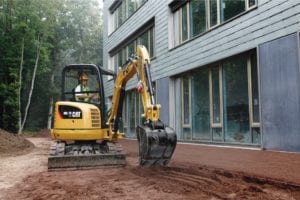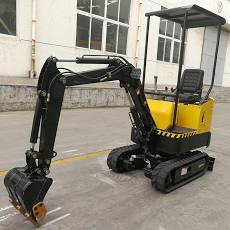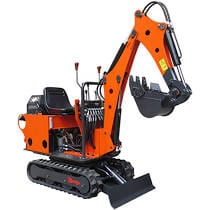How Much Do Mini Excavators Cost? Calculate the Price
Large excavators are quite expensive, but mini excavators pack a punch for their size and cost. How much are they? Here's a complete guide and price analysis.
Used in hundreds of different projects across landscaping, agriculture, construction, and much more, it's no wonder that the global mini excavators market size is expected to reach $11,873,000 by 2027.
But which mini excavator is the right one for you? Looking at cost comparisons can help. This article delves into the details of what types of mini excavators there are and lists the pros of some of the most popular brands and models to help you make an educated decision.

Discover everything you need to know about mini excavators.
Why You Need a Mini Excavator
Mini excavators are similar to regular excavators. They have the traditional features of regular excavators and most of the same capabilities. However, they also have the added benefit of being able to operate in small spaces. Although they are small, these machines are able to work on any kind of terrain quickly and efficiently.
Some of the projects mini excavators are generally used for include:
- Landscaping
- Home renovation
- Demolishing small buildings
- General digging
- Tree harvesting & stump removal
- Material handling
- Digging graves
- Road-related projects
Types of Mini Excavators
What type of mini excavator you need depends on the project or terrain you are using it on. Let's take a look at the benefits and comparative costs of each one.
Crawler Excavators
Just like a tank, the crawler (also called tracked) excavator moves on two rotating tracks. It uses hydraulic power and can be used for a wide range of tasks, from construction, to waste management, demolition, river dredging, and forestry, among many more. Some crawler excavators come with an expanding track.


A crawler excavator beats its wheeled counterpart not only on price but on certain terrain, specifically slopes. The crawler excavator can climb slopes of up to 30% and is also more stable than the wheeled type. In addition, tracks, unlike wheels, can't be punctured by common materials found in construction sites, like rocks, raw materials, or uneven stones.
The crawler system makes it better for rolling through undulating areas, such as hills, which makes it a great choice for something like forestry. Its agility means that it can reach areas that are difficult to access. On steep, muddy, or rough ground, you can't beat the crawler excavator's superior traction and maneuverability.
Cost: Buying a used tracked excavator with an operating weight of 10-14 tonnes will cost you in the range of $25,000 to over $330,000.
Wheeled Excavators Cost
Though wheeled excavators are more expensive upfront than tracked ones, they have lower operating and maintenance costs, which balances out the cost over time.
Wheeled excavators also have an advantage because they can be driven from location to location, unlike tracked excavators which have to be transported at extra cost. They are also better on hard, flat surfaces like roads, parking lots, and other urban areas.
Cost: Depending on the model, make, and year of the machine, a used wheeled excavator with an operating weight of 10-14 tonnes will cost an average of $140,000.
Suction Excavators Cost
You need a suction excavator when dealing with a service or utility that is buried. Examples include water, fiber, electric, gas, and telecoms. The benefit of a suction excavator is that it's less invasive than traditional digging and is less likely to cause damage to the service it's trying to reach.
A suction excavator uses high-power suction to extract soil or materials and create an excavation pit. This can reduce the size of excavations by up to 1/3 compared to using traditional mini excavators.
Long Reach Excavators Cost
You need a long-reach excavator for deep excavation or to reach areas that are hard to get to with traditional diggers. They are most commonly used on demolition sites, but their other uses include bridge repairs, multi-level parking lots, and water. If you have the right attachments, an operator can remove material from a sea bed without damaging the machine.


Cost: The cost of a long-reach excavator starts at around $59,999 for a used machine.
Hydraulic Shovel Excavator Cost
This is the most powerful type of excavator. Also called a power shovel, it's most commonly used for mining but is useful for any project that involves lifting or hauling heavy and large materials, like rocks and minerals. It has a very powerful engine and a large bucket capacity.
Cost: A new hydraulic shovel excavator will cost you anywhere between $101,000-245,000, while a model that has been used for less than 2,000 hours will cost you about 25% less.
Skid Steer Excavator Cost
Unlike traditional excavators, a skid steer's booms and buckets face away from the operator. This makes them useful for moving in narrow spaces and through tricky turns. They are most frequently used for smaller projects, residential work, site clearing, pool clearing, and debris removal.
Cost: Depending on the model, make, and year you can get a skid steer excavator for as low as $29,960.
The Best Mini Excavators
There is no standard cost for a mini excavator. Each brand and model has its own pricing. Let's take a look at the most popular mini excavators in 2021.
Yanmar ViO35-6A Excavator Price
The Yanmar ViO35-6A is extremely popular with users. Described by the company as the most advanced excavator they have ever made, it delivers up to 20% less fuel consumption than any of their previous models.
Weight: 8,214 lbs
Horsepower: 24.4
Digging depth: 11'3″
Pros:
- Advanced technology zero tail swing
- Tier 4 engine
- Eco-mode
- Auto-deceleration modes
- 20% less fuel consumption
John Deere 35G Excavator Price
The John Deere 35G was built using a proven reliable design. Operators can choose to use two different types of tracks: rubber tracks, which work on pretty much any type of terrain, or steel tracks which are better for rugged terrain.
Weight: 8,135 lb
Horsepower: 23.3
Digging depth: 10 ft
Pros:
- Zero tail swing
- Auto-idle (cuts engine speed when hydraulics are not in use)
- Auto-shutdown preserves fuel
- Tier 4 engine
- Multifunction monitor
Kubota KX040-4 Excavator Price
The Kubota KX040-4 has replaced the KX121-3 as Kubota's most popular mini excavator. It focuses on fuel economy as well as environmental concerns with eco-mode, which, like the Yanmar ViO35-6A can save fuel consumption up to 20%.
Weight: 9,830 lb
Horsepower: 42.4
Digging depth: 11'3″
Pros:
- Eco-mode
- Auto-downshift travel motors
- Digital panel with 90 days of operating history recorded
- Auto-idle system
- 20% less fuel consumption
Caterpillar 330CL Excavator Price
According to its makers, the CAT 330CL has the industry's highest level of standard factory technology along with 25% lower maintenance costs and 45% more operating efficiency than its other models.
Weight: 77,400 lb
Horsepower: 244
Digging depth: 36'9″
Pros:
- 20% more fuel efficiency
- 25% lower maintenance costs
- 45% higher operating efficiency
- Built-in Cat GRADE with 2D, Grade Assist, and Payload
Bobcat E32 Excavator Price
The Bobcat E32 comes in a variety of configurations. You can choose from the extendable-arm version, the long-arm version, or the standard version. Both the long-arm and extendable-arm versions come with turbocharged engines. If your project involves work that has width restrictions, such as doors or gates, this mini excavator is the ideal one for you.
Operating weight: 7,183 lb
Horsepower: 24.8
Digging depth: 10'2″
Pros:
- Advanced hydraulic system
- Selectable hydraulic control
- Turbocharged engines for long-arm or extendable-arm versions
- Auto idle
- Auto shift
Cost of a New Mini Excavator
This depends on the brand, model, digging depth, horsepower, and size, as well as the accessories you want to add on. However, on average, you can expect a new small excavator to cost you anywhere between $94,000 and $334,000.
Smaller excavators that weigh from 10 to 15 tonnes usually cost anywhere between $81,000-$139,000. Machines that weigh 15-20 tonnes are in the mid-size range and cost between $87,000-$200,000. The biggest mini excavators generally weigh between 30 to 40 tonnes and can cost anywhere from $200,000-$500,000.
Mini Excavator Attachments
The cost of a new mini excavator also depends on the attachments you choose. These include augers, breakers, buckets, clamps, couplers, grading blades, trenches, and more. You should generally allow an additional $5,100-$10,000 for attachments.



Cost of a Used Mini Excavator
The cost of buying a used mini excavator depends on the age of the model you are purchasing. Most used mini excavators cost between $13,900-$30,7500. However, newer used models can cost anything between $20,000-$90,000. Generally:
- Digging depth of fewer than 10 ft and horsepower of lower than 20 could cost between $14,000-$20,500
- Digging depth of 10-12 ft and horsepower of more than 25 can cost up to $25,100
New Mini Excavator Pros and Cons
To help you decide whether you need a new mini excavator for your project, here are the pros and cons of a new mini excavator.
Pros: New mini excavators use more advanced technology. The new models that come out are optimized for more comfort for the operator who spends hours in it per day. They also tend to have better fuel efficiency, enhanced productivity and are easier to operate.
A new machine also means that you can specify and choose the attachments you want. You can include the features and specs you have a use for and reject the ones you don't need. Last but not least, new machines come with a warranty so you don't have to worry about additional repair costs for at least the first year.
Cons: The only real downside to buying a new mini excavator is the cost. If you have a small to mid-size business, you may not be able to afford a mini excavator at full price, which makes purchasing a new one a very good option.
Cost of Renting a Mini Excavator
Depending on your requirements and budget, it might be worth renting a mini excavator instead of buying one. There are many factors that affect the cost of renting. These include the size, capacity, age, and model of the excavator.
Other factors that are taken into consideration are the duration of the job, the location of your site, and the attachment(s) you want your machine to be equipped with. Of course, different dealers will also have varying prices.
Renting a mini excavator could cost you:
- Daily renting charges can normally cost anything from $153 to $510.
- Weekly rents may fall anywhere between $805 to $2,100 and
- Monthly rents can cost you anything between $2,606 to $4,050
Other Renting Related Costs
Apart from the cost of renting the actual machine, there are other costs to consider when renting a mini excavator.
Operator Rate
If you don't have an operator of your own, the rental company you are using will have to supply you with one. This generally costs $32-$50 per hour.
Fuel
For smaller machines, the fuel rate should not be too high. However, larger machines will certainly guzzle more fuel.
Transportation of Equipment
If you aren't doing this yourself, the rental company will charge you for the service. Charges are usually calculated per mile.
Attachments
If you need extra attachments or accessories on the machine you are renting, you will need to pay for these separately.
Cost Comparisons and the Experts
Cost comparisons are vital to making good purchasing decisions, especially when it comes to expensive items or services. If you're trying to find out what the best deals are, visit our website. Our partnership with some of the most trusted companies in the U.S. helps you compare prices for products or services used in homes and businesses.
We take care of the heavy lifting by researching the national average costs and pairing it with plenty of buying advice so that you can make informed purchases. You can get a free quote and we'll connect you with reputable sellers to choose from.
The Cost of Mini Excavators, a Summary
There are many different types of excavators, including tracked, wheeled, suction, long-reach, hydraulic shovel, and skid steer. They are used across a wide range of projects. Choosing the right one depends on your needs.
Buying a new mini excavator comes with multiple benefits, but can also be very expensive. For a more cost-efficient option, you can consider either buying a used mini excavator or renting one. However, these may come with other additional costs.
When it comes to price comparisons, you should go somewhere you can trust. Our partnerships with some of America's most trusted companies, together with our free buying advice, and research helps connect you to the best sellers for what you're looking for.
We hope you found this article on the cost of mini excavators informative and useful. To know more about our service and what we can do for you, visit our website.



